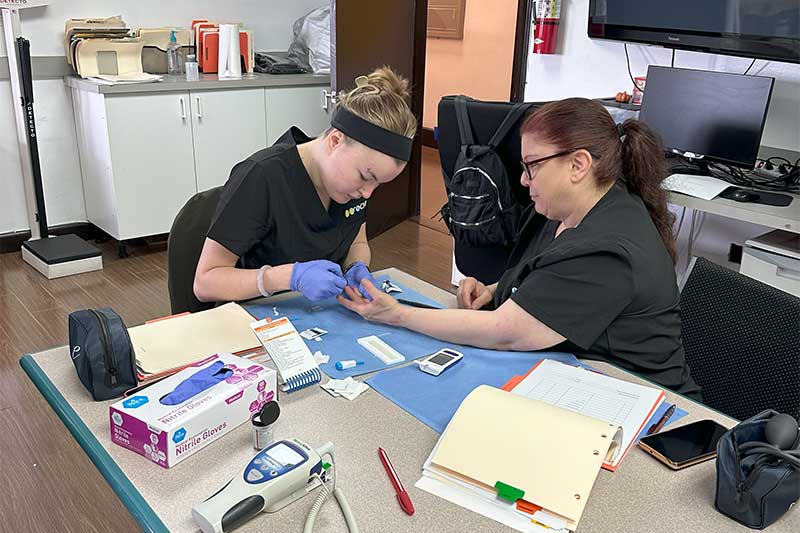Considering a healthcare career? Discover why you should choose medical assistant as a career. It can be a fulfilling and smart career choice for you. Learn about this dynamic field’s benefits, job satisfaction, and opportunities.
The healthcare industry is a robust and growing field, offering a variety of career paths for those interested in contributing to patient care and wellness. One of the integral roles within this sector is that of a medical assistant. This career choice beckons with the promise of stability, diversity in responsibilities, and the deeply satisfying reward of making a tangible difference in people’s lives.
Discover Why to Choose Medical Assistant As A Career
In this article, we will explore the myriad reasons why choosing to become a medical assistant could be a fulfilling and wise career decision. This profession’s appeal is multifaceted from the social impact and growth opportunities it presents to the practical benefits of employment.
Explore the top reasons for choosing a medical assistant as a career. Learn about the benefits, opportunities for growth, and the fulfilling path in healthcare. Start your career with impact!
A Vital Link in Healthcare
Medical assistants serve as crucial links between patients and healthcare providers. They perform various tasks ranging from administrative duties, like setting appointments and managing health records, to clinical tasks, such as taking vital signs and preparing patients for examinations. This dynamic role not only requires a versatile skill set but also offers a unique window into the inner workings of healthcare facilities.
Opportunities for Growth
The medical field is known for its pathways to advancement, and the medical assistant position is no exception. Experience in this role can be a stepping stone to further specialization or even a different career within healthcare, such as nursing or healthcare administration. The foundational knowledge and skills gained as a medical assistant provide a solid base for continued education and career elevation.
Job Stability
Healthcare is necessary, irrespective of economic fluctuations, and the demand for medical professionals continues to rise. The U.S. Bureau of Labor Statistics anticipates a much faster than average growth for medical assistants from 2023 to 2032. This forecasted demand is propelled by an aging population requiring more medical services and a growing focus on preventive care.
Personal Fulfillment
Few professions offer the personal fulfillment that comes with working in healthcare. For many, the chance to support patient welfare and contribute positively to their community is a compelling reason to select this career path. Every day as a medical assistant provides opportunities to help others and impact individual lives.
Learning Opportunities
A career as a medical assistant is replete with daily learning experiences. Medical assistants continually expand their medical knowledge and practical skills by working closely with doctors, nurses, and other healthcare staff. The exposure to various medical conditions, treatments, and technologies is invaluable for professional development.
Flexibility and Diversity
Medical assistants can find employment in various settings, from hospitals and clinics to specialized practices like pediatrics or cardiology. This openness means you can choose an environment that aligns with your interests or lifestyle. Additionally, work schedules can vary, potentially offering more flexible hours than the typical nine-to-five job.
Competitive Salaries and Benefits
While salaries vary based on many factors—including geographical location, experience, and work setting—medical assistants earn competitive wages. Many employers also provide substantial benefits packages, including health insurance, retirement plans, and paid leave. For many, these tangible benefits are a decisive factor in their career choice.
Shorter Training Period
Compared to other professions in healthcare, medical assistants can start their careers relatively quickly. Educational programs range from certificate courses that take a year to complete to two-year associate degree programs. This shorter training period allows for rapid entry into the workforce while providing the necessary employment qualifications.
Relational Work Environment
Those who thrive in collaborative environments will find the role of a medical assistant particularly rewarding. Working closely with healthcare professionals and patients fosters a sense of teamwork and community within the workplace. Building relationships with regular patients and colleagues can bring an added layer of enjoyment to the daily job.
Technology and Innovation
With the healthcare industry often at the forefront of innovation, medical assistants are frequently among the first to utilize new medical technologies and methodologies. This exposure to cutting-edge advancements makes for an exciting and evolving workday where one can witness the progression of healthcare firsthand.
Certification and Specialization
Certifications enhance a medical assistant’s employability and may lead to higher wages. Specialized certifications in areas like phlebotomy, EKG, or medical billing can further increase job prospects and income potential. These certifications represent a commitment to the profession and a dedication to providing the highest quality of care.
Contributions to Public Health
Medical assistants participate in larger healthcare initiatives, such as public health campaigns and preventative care education. By assisting in these areas, they contribute to improving the overall health of communities and have a hand in shaping better public health outcomes.
A Stepping Stone or Lifelong Career
For some, a medical assistant role serves as a stepping stone to higher positions in the medical field, while for others, it becomes a lifelong career. The satisfaction derived from direct patient interaction and the varied tasks that define each day makes it an attractive and enduring choice for many.
Empathy in Practice
The physician may diagnose, and the nurse may administer treatment. Still, the medical assistant often spends the most time with the patient, explaining procedures, gathering history, and offering comfort. This unique position to practice empathy and compassion is both a privilege and a unique benefit of the job.
Balance of Clinical and Administrative Skills
The dual nature of a medical assistant’s work—combining clinical and administrative tasks—means that each day is filled with various activities. The role is especially fitting for individuals who enjoy a balance of desk-based duties and direct patient care.
In conclusion, becoming a medical assistant is a meaningful decision routed through practicality and passion. This career path promises job security and growth and provides daily doses of human connection, learning, and personal achievement. For those looking to enter the healthcare industry, it offers an accessible and potentially suitable route and the promise of a fulfilling profession that makes a difference.




